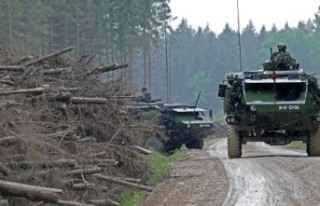Meeting in Strasbourg plenary, MEPs approved Wednesday, July 6, the European Commission's "green" label for gas and nuclear. These are two energy sources that have been recognized as essential to combat climate change.
In January, the Commission presented a controversial text that classified as "sustainable" certain investments in the production of electricity in nuclear power plants, which emit no CO2 or gas-fired energy stations. This is provided they use the most advanced technologies. This classification, also known as "taxonomy", should be used to mobilize private capital for these projects. This is part of the EU’s goal of carbon neutrality by 2050.
After the green light was given by the member states, the opponents announced they would initiate legal proceedings to stop the initiative.
"I ask that you do not reject this fragile compromise, which was negotiated with care," Petr Fiala (Czech Prime Minister) asked Wednesday morning. His country had just taken over the rotating presidency of EU from France. He pleaded, "Nuclear power and natural gas from safe countries will not be the only way for some member state to reach our common climate goals over the coming years."
Environmental organizations have reacted furiously to the recognition that nuclear and gas contribute to combating climate change. This was based on expert reports. The term "green" was once reserved for renewable energy.
A few dozen activists from both pro- and anti-nuclear movements protested face to face on Wednesday morning after the first demonstrations of environmental defense groups on Tuesday. They wanted to challenge MEPs at the European Parliament upon their arrival.
The anti-gas side had also spoken out in the hemicycle during Tuesday's debate. "How can we get other countries to cut their use of fossil fuels, if they are classified as green?" Bas Eickhout (Greens), was the Dutchman who had created it.
MEPs voted for an objection proposal that was adopted by the Economic Affairs and Environment committees on June 14. This is synonymous with a veto of the European executive text. To block the text of the Commission, an absolute majority of 353 votes was needed.
While no one says that nuclear and gas are green energy, they are essential to the transition. Gilles Boyer, a French MEP (Renew) said that we must make it possible to avoid oil and coal.
Mairead McGuinness (Financial Services Commissioner) said that the EU taxonomy "prioritizes energy efficiency and renewables." She was defending her text in Strasbourg. However, the EU executive believes renewables will not suffice to meet the increasing demand for electricity because of their intermittent production. Therefore, it is necessary to encourage, at most on a temporary basis, investment in stable and manageable means like nuclear and gas.
The member states have already approved the "green" label to these two energy sources. During consultations conducted by the French Presidency of the Council of the EU (far from the 20 countries required to block the project), only eight countries expressed opposition. France, which is keen to restart its nuclear industry, as well as central European countries like Poland, who must replace their coal-fired energy plants, support the Commission.












